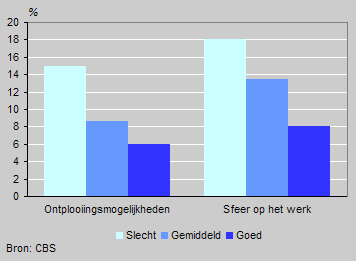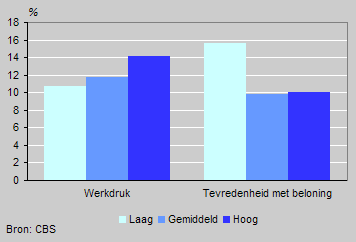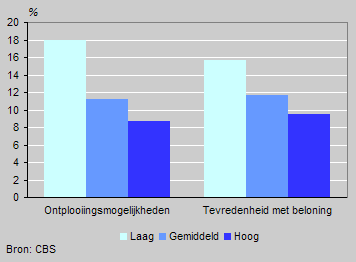Depression and stress in the workplace

People suffering from work-related stress more often suffer from depression or feelings of anxiety, too. Stress includes factors like high pressure of work, few opportunities for self fulfilment, a bad atmosphere at work or dissatisfaction with earnings.
One in ten workers suffers from depression
One in ten workers had been downcast or depressed for at least two weeks in succession in 2002. The more pressure they are under at work, the more likely people are to report being downcast or depressed. These symptoms also increase as people have fewer opportunities for self-fulfilment or have to work in an unpleasant atmosphere
Depression by possibilities of self-fulfilment and workplace atmosphere, 2002

More feelings of anxiety at work
One in eight workers experienced feelings of anxiety for at least two weeks in succession in 2002. Anxiety is also related to work stress. Again, the greater the pressure at work, and the fewer the possibilities for self fulfilment, the more likely people are to suffer from feelings of anxiety. Dissatisfaction with earnings and a bad atmosphere also increase feelings of anxiety.
Feelings of anxiety, by work pressure and satisfaction with earnings, 2002

Poor health and the work situation
Nearly nine out of ten people with a job say their health is good. For people with few possibilities of self fulfilment 18 percent said their health was average to poor, compared with 9 percent of people who had ample possibilities for self fulfilment. Dissatisfaction with earnings and a bad atmosphere also correlated to poor health. High work pressure, however, did not.
Average to poor health by possibilities for self-fulfilment and satisfaction with earnings, 2002

Feelings of dejection also stress-related
More than seven out of ten workers had experienced feelings of dejection such as headaches, fatigue, sleeplessness, backache, pain in muscles and joints.
The higher the work pressure, and the less satisfied people are with their earnings, the more feelings of dejection they are likely to have. Workers with few self-fulfilment opportunities, too, suffer more from feelings of dejection.
Christianne Hupkens
Source: StatLine